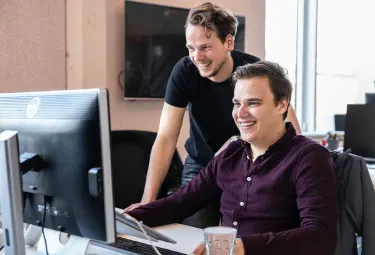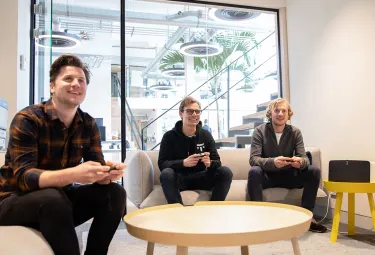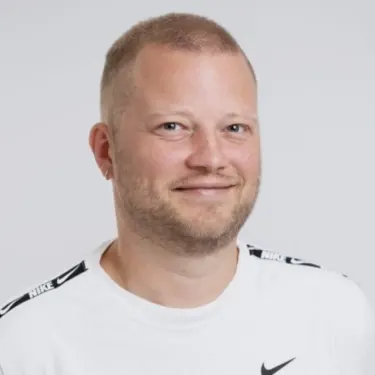People • 17.11.2022
People
Developer story: the week of a senior front-end developer
20 december 2021
A senior front-end developer is known for having to write a lot of code. Although that is not the only thing you do. Besides the different projects you work on, you also coach junior and medior colleagues on technical skills and of course with soft skills and personal development. One of those senior front-enders is Maikel, who has been part of the Touchtribe family for two years now. He started as a medior, and has grown into a senior developer.
"I didn't follow a typical path at Touchtribe. In fact, when I came in I was already a medior, but working with a slightly different tech stack. In the meantime, I made NextJS, React and Redux all my own and moved up to a senior role." Maikel is currently working on three projects, namely: Vidua, Fit For Free and Campercontact. He is mainly implementing a headless architecture, that helps his clients move forward. He likes to tell you more about his work and how his week looks like by describing five typical parts of his week.
Monday: collaboration within the development team
On Monday, Maikel doesn't just start the week... But also with a good cup of (in his case everything but) coffee. Usually always at the office, but lately also more often at home. During the week start he discusses with his colleagues which projects he will be working on that week and whether he needs help with anything from another colleague. Now you're thinking, where's the informal talk about the weekend? That fits perfectly into the morning or afternoon coffee moment he has with his team every day. Normally physical, now online. Every day there are two fixed (and of course optional) online moments where all Touchtribe colleagues can catch up. Great for team building!
As senior developer Maikel has regular tech meetings with the other seniors, where the latest technologies and developments are discussed. How can the developers within Touchtribe best develop technically? Which techniques will we use? How do we ensure that everyone is up to date? This can be done, for example, through the Starter Kit of each project which contains all new implementation of techniques, but also by sharing knowledge in various knowledge share sessions.
Delen
Every month a colleague has the chance to highlight his or her project in a Showcase. Whether it's your first project, technically advanced or just really interesting, you can share your knowledge with your colleagues in the Showcase. In addition, after all the stories about projects in the week-start, it is also nice to see the end results of colleagues.
For me, it was important to have colleagues I could spar with, with the same interests and drive to be technologically advanced.
Tuesday: a technical challenge in projects
Once Maikel has started the week well, he dives into the code. Two of the most challenging projects he has done are Fit For Free and Vidua on which he worked with a medior colleague. "I was responsible for contacting and managing the client. In addition, together with our tech lead, I determined the tech stack and monitored the code. All of this, of course, was in sync with mentoring colleagues."
What has stuck with Maikel the most around the Fit For Free project is that he and his team increased the conversion rate by 15%. This was achieved via A/B testing with NextJS, automated end to end testing with CypressJS combined with flexible content funnels via Contentful. "In addition, the implementation of OAuth2, an authentication app, in the Vidua project has been a nice technical challenge. Especially if you include the unit testing," says Maikel.
Wednesday: coaching colleagues
In the middle of the week it is time for a bit of coaching. Besides coaching colleagues in projects Maikel is also a mentor of three colleagues: Bart, Tim and Sven. These colleagues do not necessarily have to be in a project with him and he also coaches them in their personal careers. How are the colleagues doing? Where do they want to develop themselves? Where do they run into problems? These are typical questions that Maikel discusses with his mentees.

"Really getting more responsibility and the opportunity to mentor colleagues were mainly the reason I started working at Touchtribe." says Maikel. With one of his mentees, Sven, he also works in the Fit For Free project. Every week they look at the backlog with the client. Maikel helps Sven to make the requirements concrete and to set priorities. He is always there for questions in between: "For example, the other day I was implementing a new API of Google Analytics and wanted to check with him whether I implemented a certain method correctly. I can always reach him to have a look at it together," says Sven. Giving feedback in code reviews is also important, as it helps Sven to write clear and easy-to-maintain code.
If I have any questions during development about certain technical aspects, such as integrating new APIs, I can always contact Maikel for a short (online) 'meet' and we'll have a look at the code together.
Thursday: filling in Personal Development Time
The main difference with his junior colleagues is, working independently within projects. "A junior colleague does not work independently on a project, but always has the guidance of a senior. For example, I recently helped Bart create a multi-step form for customer Vidua." tells Maikel. This does not mean that Maikel always works alone on a project, but the possibility is there. He often works in a mixed team of junior, medior and senior developers.
Every developer within Touchtribe has 10% PDT: Personal Development Time. Because Maikel works together with other junior and medior developers in projects, he can give good advice on what they can spend this time on. Are there any technical skills that colleagues want to improve? Or more project skills? Do they want to share knowledge by writing a blog? Anything is possible, as long as you substantiate it. Maikel spends his time on, for example:
Conduct studies on the architectural patterns of applications and best practices.
Investigate solutions for micro-frontends.
Practice unit testing and end to end testing.
Extend and apply knowledge of TypeScript.
Friday: Mario Kart with a beer
On Friday (afternoon) it is really time for Mario Kart and often including a beer. Together with his colleagues, Maikel likes to make time for this. As Linda would say: "It is not a question whether we go play Mario Kart, but when". And this doesn't stop at just playing at the office. They regularly challenge each other to a race online as well.
"That's kind of the advantage of having a small team," indicates Maikel. "We are with a team of 20 developers, so you have quick contact with everyone and you can easily find each other online even in these times." Fortunately, it looks like the legendary team events will soon be able to take place again. Which one did he remember the most? Surely that was the 2019 Christmas drinks with all of Makerstreet Development.
Would you like to mentor colleagues just like Maikel, work on technically challenging projects and do this with a small close-knit team? Then check out our vacancies via the working at page.

Delen

